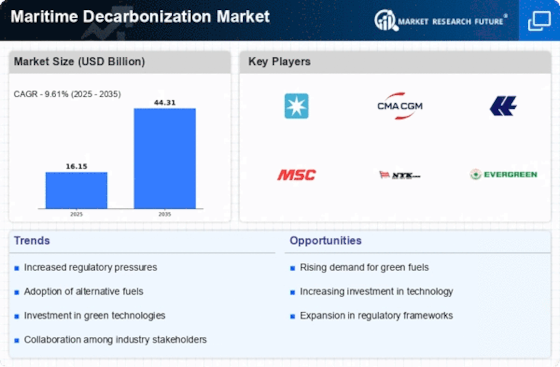Top Industry Leaders in the Maritime decarbonization Market
*Disclaimer: List of key companies in no particular order
Top listed companies in the Maritime Decarbonization industry are:
Shell, Wartsilla, CMA CGM Group, Maersk, and others
The maritime industry, long a vital artery of global trade, faces a monumental challenge: decarbonization. International regulations, environmental concerns, and shifting fuel landscapes are propelling a transformative wave, reshaping the competitive landscape of this traditionally slow-moving sector. Let's navigate the currents of this dynamic market, examining key player strategies, market share analysis factors, emerging trends, and the overall competitive scenario.
Key Player Strategies:
• Traditional Maritime Giants: Established shipping companies like Maersk, CMA CGM, and Hapag-Lloyd are adopting a multi-pronged approach. Investments in alternative fuels like ammonia and hydrogen, pilot projects for wind-assisted propulsion, and collaborations with fuel technology startups are defining their roadmap.
• Renewable Energy Pioneers: Companies like Ørsted and Siemens Gamesa are leveraging their expertise in green technologies to enter the maritime space. Developing offshore wind farms dedicated to powering ships and collaborating with ports for shore power solutions are their key strategies.
• Technology Innovators: Startups like GoodFuels and Airseas are bringing disruptive solutions to the table. Biofuels made from waste oils and innovative wind propulsion systems are examples of their disruptive potential.
• Classification Societies and Regulators: Organizations like Lloyd's Register and DNV GL are playing a crucial role in setting safety standards and regulations for alternative fuels and technologies. Collaborating with industry players and governments is their focus.
Market Share Analysis Factors:
• Early Adoption of Alternative Fuels: Companies who secure reliable and cost-effective alternative fuel supplies first will gain a significant edge. Partnerships with fuel producers and early investments in infrastructure will be crucial.
• Technological Innovation: Developing and deploying efficient low-carbon technologies like fuel cells, onboard carbon capture systems, and wind propulsion solutions will unlock market share dominance.
• Regulatory Compliance: Companies with proactive strategies to meet evolving IMO regulations and carbon intensity reduction targets will have a competitive advantage.
• Collaboration and Partnerships: Building strong partnerships across the value chain – fuel producers, shipyards, technology providers, ports, and cargo owners – will be critical for success.
New and Emerging Trends:
• Green Corridors: Establishing dedicated shipping routes powered by low-carbon fuels or shore power is gaining traction. Pilot projects like the North Sea Wind Power Consortium showcasing collaboration and infrastructure development in specific regions.
• Digitalization and Optimization: Utilizing AI and big data to optimize routes, fuel consumption, and port operations will improve efficiency and reduce emissions.
• Circular Economy in Shipping: Exploring waste-to-fuel solutions, like using recycled plastics for biofuels, is gaining momentum.
• Focus on Port Infrastructure: Developing shore power facilities, green hydrogen bunkering stations, and efficient cargo handling processes are crucial for enabling cleaner shipping.
Overall Competitive Scenario:
The maritime decarbonization market is characterized by intense competition and collaboration. Traditional players are facing disruption from new entrants with innovative technologies and business models. The race to secure reliable and cost-effective alternative fuels and develop efficient low-carbon technologies is fierce. Collaboration across the value chain, proactive regulatory compliance, and adaptability to emerging trends will be key differentiators in this rapidly evolving landscape. Success will hinge on navigating this sea of change with agility, vision, and a commitment to a sustainable future for the maritime industry.
Latest Company Updates:
Shell:
• Dec 22, 2023: Shell announces its Beehive project, aiming to develop a large-scale green hydrogen production facility in Rotterdam, Netherlands, to supply fuel for maritime shipping. (Source: Shell press release)
Wärtsilä:
• Jan 5, 2024: Wärtsilä partners with shipowner ESL Shipping to develop and test a methanol-powered cargo ship, aiming for a 90% reduction in CO2 emissions. (Source: Wärtsilä press release)
CMA CGM Group:
• Dec 13, 2023: CMA CGM orders nine LNG-powered container ships from Chinese shipyard CSSC, further expanding its fleet of cleaner vessels. (Source: CMA CGM press release)
Maersk:
• Jan 9, 2024: Maersk announces a partnership with Ørsted to develop a green hydrogen production facility in Denmark to supply fuel for its container ships.










